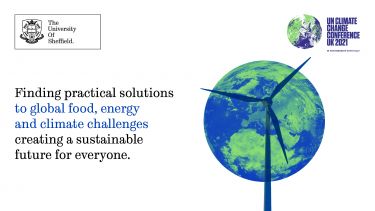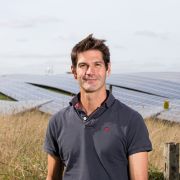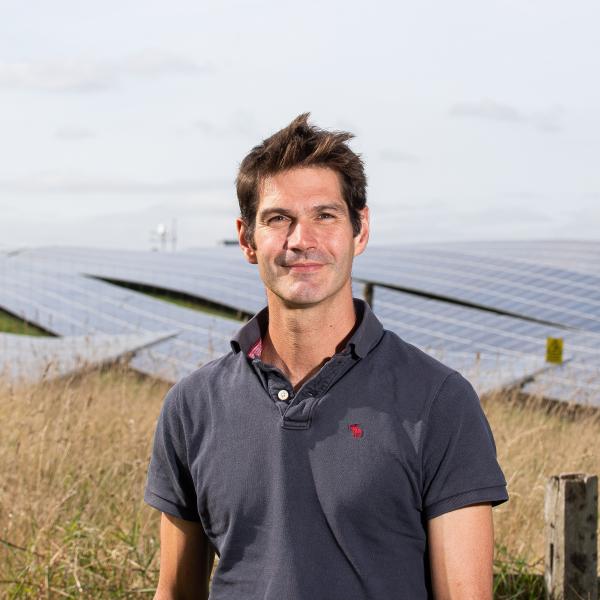COP26: Energy Institute experts share their thoughts on how we should respond to the climate crisis
In November 2021, the UK will host the 26th UN Climate Change Conference of the Parties (COP26).
In the run-up to COP26, we asked leading experts in key energy areas here at the University's Energy Institute what their research area need to be doing to reach sustainability goals by 2050.

Professor Dave Stone - Energy Storage
"The move towards net-zero by 2050 is not a simple task. The replacement of fossil fuel generation by alternative ‘green’ generation may at first appear straightforward if you examine the headline generation capacities involved, but the truth is hidden in the availability of the generation. Fossil fuel generation can be turned on and off as required, producing a steady supply of energy when it is needed the most. Green generation, wind and solar for example, are only available when either the wind is blowing, or there is light available. The availability of the resource is not necessarily when the energy is required.
Energy storage forms the key to making better use of the available resource. Generate as much energy as you can, when you can, store it and use it when you need to. Unfortunately, the storage of electricity, electrochemically in a battery, is not ideal. Self-discharge of batteries, low energy/power densities, lifetime degradation with use and recyclability are all key areas that need to be improved upon with battery technology in general. These technology areas are therefore key focuses of University research.
Additionally, the development of improved storage technologies has to be supported by more targeted research into the better deployment of energy storage in various applications, and improved management of the existing technologies to lessen the impact of cycling and ageing on the storage technologies we have. Key challenges to the future are therefore the development of better storage technologies, and better understanding, control and deployment of the existing technologies already at our disposal, as we move towards net zero."
Professor Martin Mayfield - RISE
"Decarbonising heat is recognised by the UK’s Climate Change Committee as the most complex and difficult challenge we face if we are to reach our target of becoming net-zero before 2050.
The resources, infrastructure and built environments (RISE) research area need to acknowledge that the issue is plagued by a plethora of vested interests and a lack of data and knowledge of the systemic nature of the problem. There's a lot of focus on hydrogen to heat domestic buildings but there are many technical and financial challenges associated with it which may mean it cannot play a larger role as currently predicted. What is needed is a data-driven and systemically coherent approach to reducing demand and utilising dynamic data to balance supply and demand across the network.
Designing new buildings to the necessary thermal standards is comfortably within reach of current technical understanding; the challenge here is for Social Science to address the lack of take up of these standards. The heart of the problem is the 28 million homes in the UK that are currently, in general, of incredibly poor thermal performance (including new buildings).
We have almost run out of time. We need to address this issue in the next decade, not by 2050 if we are to meet our decarbonisation targets. The challenge of sustainably heating homes needs to be seen in the context that humanity is highly unlikely to decarbonise at the rate needed to avoid catastrophic climate change. In this light, the retrofitting of our homes becomes even more important as we will be dealing with extreme weather events at an accelerating frequency.
The quicker we acknowledge and address these issues, the less difficult, costly and painful it will be. The role of our research community is to develop consensus around these issues and provide clear pathways to address them. If we do not do this, our standing in society will diminish as the theoretical challenges become increasingly real and their impacts felt across society."
"Achieving net-zero by 2050 is going to be very difficult – if not impossible. History tells us that 28 years will not be enough time to realise the potential of nuclear fusion, deploy nuclear fission at the scale that is needed, geo-engineer our way out or even transition to hydrogen as an energy vector. So it’s lucky that there is a range of technology options that are consistent with net-zero that can be achieved.
The last 20 years also tells us that distributed, modular and scalable approaches such as improving the insulation properties of buildings, generating more intermittent electricity through solar and wind power, storing it electrochemically and electrifying transport and heating are all possible at investment and risk levels that can be afforded. Albeit they have not achieved anywhere near the scale needed to solve the problem.
The challenge of the next 28 years is to manage the regulation around the investment in these distributed technologies, so that as a global society we maximise the speed of reduction, and minimise the economic cost, of carbon reduction of the whole energy system.
The problem is that not only is the regulation of energy not currently fully consistent with whole system decarbonisation – even if it was, the data needed to make the relevant investment decisions is locked away under outdated information governance and in the grey filing cabinets of organisations set up to serve a centralised supply and demand energy network. Until the data is liberated, even with the best intentions organisations will not be able to make the right decisions, and worse, often they won’t be able to make any decisions at all.
For example, in Great Britain, where are the electricity cables that connect homes, offices and factories to substations? This data is barely available to the owners of the cables let alone available to the home and factory owners that rely on them. How much energy does a group of homes or a factory use on a minute by minute basis? If this was known, then low carbon technologies could be deployed where they would maximise carbon reduction. However, this data is not available even though the government has invested billions in smart meters that are supposed to measure it.
So the challenge of net-zero is about information, regulation and governance and not technology. The British government has realised this and initiated a wide-ranging programme of innovation around digital energy, but they are moving slowly and missing many of the practical barriers and problems. New regulation is being added, but without clearing out the old this leads to a legal quagmire. As a research community, we need to work on this data problem with as much energy and enthusiasm as we show to new technology development. Because at the end of the day it’s not technology that will save the day – it will be well-coordinated policy and regulation."
Professor Lenny Koh - Circular economy
"Various net-zero goals have been set by nations to achieve sustainability - UK’s and USA’s net-zero by 2050, Europe’s climate neutrality by 2050, China’s carbon neutrality by 2060. All of these goals require a mix of energy technologies from CCUS to nuclear, hydrogen, renewable and electrification/storage, low carbon and circular economy solutions, green and sustainable supply chains, complementary policies, investments and skills that result in immediate results now, as well as innovative groundbreaking ones. In addition, nature-based solutions and negative emission technologies including enhanced rock weathering, BECCS, direct air capture, afforestation and biochar will play an important role to ensure the protection of biodiversity and ecosystems balance of the planet in addressing global climate change.
Green is gold. Advancing the understanding of the resiliency and sustainability of these supply chains is crucial, along with the discovery of circularity potential in converting waste or resources to new resources/materials/fuels. We are a world leader in this related field.
Advancing and deploying cutting-edge modelling, analytics and methodologies across social science, engineering and science disciplines, we pioneer 4 advanced software tools and platforms (SCEnAT, SCEnAT+, SCEnATi and SCEnAT 4.0) to aid decision making towards net zero and resource efficiency. We work closely with our technology partner Microsoft on these suites of solutions for sustainability and net-zero directions, leveraging world-leading digital technologies including Azure Cloud, AI, ML, DL and others. We work in partnership with industry and policymakers advising sustainable, low carbon and net zero practices and policies informed by our research. Achieving net-zero will need fundamental integration of a resource sustainable supply chain system where resource life cycle and efficiency are built into the DNA."
Professor Dave Stone - Wind power
Dave Stone, Professor in Electrical Engineering at the University's Department of Electronic and Electrical Engineering, tells us how research at the Energy Institute is helping to improve the future of wind power:
"Wind power is often seen as the solution to a majority of the looming energy problems which will be brought about by the move towards net zero. Whilst it is true that wind power is a vast resource, which still has plenty of potential for energy generation, there are a number of critical issues which need to be addressed around the deployment of wind generation. The two major approaches to harvesting wind, on-shore and offshore wind farms suffer from differing problems. For example, onshore wind has issues surrounding the siting of turbines, both from perceived nuisance to the availability of uninterrupted and non-turbulent airflow. Offshore generation, in contrast, does not have the same issues of airflow and nuisance to neighbours but has other issues such as depth of seabed for foundations and maintenance.
The extremely high costs of both maintenance and downtime of offshore generation present a number of technological challenges around the reliability of both the power electronics within the wind turbine and the actual turbine mechanics such as the gearbox. One area the university is working on to address these issues is in the design of next-generation direct-drive generators for wind turbines, which remove the need to have a gearbox between the blades and the electrical generator. The generator, therefore, is able to operate at the low mechanical speed of the blades, yet generate electricity efficiently. Also, alongside these developments, splitting the machine into segments allows easier smaller and lighter generator components for assembly of the generators in the challenging conditions posed by the offshore location.
Working closely with world-leading wind turbine manufacturers, the University is providing cutting edge technology to address the reliability of future generators, and lower the costs of future electricity generation from renewable sources such as wind."








